Blog
Should I Cut an Ingrown Toenail?
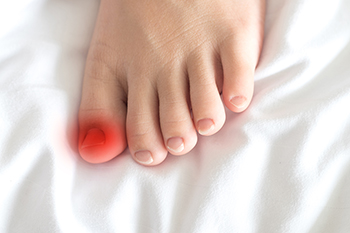
Even if you do not know all that much about the field of podiatry, there is a chance that you might already be familiar with what an ingrown toenail is. This condition is essentially characterized by the growth of the side of the toenail into the skin, such that inflammation and redness occurs. Many individuals living with an ingrown toenail often like to ask whether or not they can cut their ingrown toenails by themselves. The answer is that if a toenail is already ingrown, it is best not to attempt to cut it by yourself. Trying to do this by oneself can essentially increase the risk of possible infection. It might also make the ingrown toenail worse. Rather, an individual should seek out the guidance of a medical professional such as a podiatrist. If you are someone who is currently living with an ingrown toenail, it is suggested that you contact a podiatrist today.
Ingrown toenails can become painful if they are not treated properly. For more information about ingrown toenails, contact Dr. Douglas Mckay of New Jersey . Our doctor can provide the care you need to keep you pain-free and on your feet.
Ingrown Toenails
Ingrown toenails occur when a toenail grows sideways into the bed of the nail, causing pain, swelling, and possibly infection.
Causes
- Bacterial infections
- Improper nail cutting such as cutting it too short or not straight across
- Trauma to the toe, such as stubbing, which causes the nail to grow back irregularly
- Ill-fitting shoes that bunch the toes too close together
- Genetic predisposition
Prevention
Because ingrown toenails are not something found outside of shoe-wearing cultures, going barefoot as often as possible will decrease the likeliness of developing ingrown toenails. Wearing proper fitting shoes and using proper cutting techniques will also help decrease your risk of developing ingrown toenails.
Treatment
Ingrown toenails are a very treatable foot condition. In minor cases, soaking the affected area in salt or antibacterial soaps will not only help with the ingrown nail itself, but also help prevent any infections from occurring. In more severe cases, surgery is an option. In either case, speaking to your podiatrist about this condition will help you get a better understanding of specific treatment options that are right for you.
If you have any questions please feel free to contact one of our offices located in Caldwell, and Galloway, NJ . We offer the newest diagnostic and treatment technologies for all your foot and ankle needs.
Are Bunions Affecting Your Everyday Life?
Common Foot Problems During Pregnancy

Most women who are pregnant experience some type of foot problem. The most common are swelling, collapsed arches, plantar fasciitis, and dry or cracked heels. Swelling in the feet is generally the result of constricted blood flow to the lower extremities, caused by pressure on the veins in the pelvic region. This results in a condition called edema, where blood and fluids collect in the feet and ankles. A podiatrist can offer simple solutions to this problem. Added weight during pregnancy often results in a collapse of the arches, which may affect stability. Wearing supportive shoes with ample arch support is often recommended by podiatrists. Pain in the heel is generally caused by tears to the band of tissue under the feet, called plantar fascia. Proper footwear and performing a series of exercises can help relieve the pain. Finally, cracked heels may result from a change in hormonal balance during pregnancy that causes a loss in elasticity and moisture in the feet. This can be solved by moisturizing the feet daily. For further help with any type of foot pain during pregnancy, it is suggested that you consult a podiatrist.
Pregnant women with swollen feet can be treated with a variety of different methods that are readily available. For more information about other cures for swollen feet during pregnancy, consult with Dr. Douglas Mckay from New Jersey . Our doctor will attend to all of your foot and ankle needs.
What Foot Problems Can Arise During Pregnancy?
One problem that can occur is overpronation, which occurs when the arch of the foot flattens and tends to roll inward. This can cause pain and discomfort in your heels while you’re walking or even just standing up, trying to support your baby.
Another problem is edema, or swelling in the extremities. This often affects the feet during pregnancy but tends to occur in the later stages.
How Can I Keep My Feet Healthy During Pregnancy?
- Wearing orthotics can provide extra support for the feet and help distribute weight evenly
- Minimize the amount of time spent walking barefoot
- Wear shoes with good arch support
- Wear shoes that allow for good circulation to the feet
- Elevate feet if you experience swelling
- Massage your feet
- Get regular, light exercise, such as walking, to promote blood circulation to the feet
If you have any questions please feel free to contact one of our offices located in Caldwell, and Galloway, NJ . We offer the newest diagnostic and treatment technologies for all your foot and ankle needs.
Stretches May Provide Relief From Heel Spurs
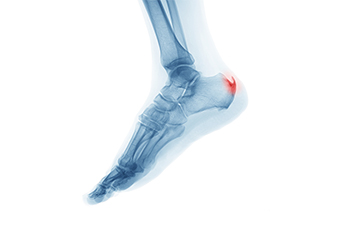
Heel spurs are often uncomfortable, and patients may benefit from performing certain types of stretches and exercises. These may help to lengthen the plantar fascia, which can reduce stress on the heel. Calf stretches can be effective in finding relief from heel spurs. This is done by standing on a step and lowering one heel at a time until a gentle stretch is felt. The foot can be slowly rocked back and forth, which can help loosen the plantar fascia. An additional stretch for plantar fascia is done by sitting on the floor with the affected foot crossed over the opposite knee. This is followed by taking a towel or similar object, wrapping it around the sole of the foot, and stretching the foot towards the body. Heel spurs may be prevented by wearing shoes that fit correctly and by limiting time walking and standing on hard surfaces. If you have a heel spur, it is strongly suggested that you are under the care of a podiatrist who can guide you toward proper treatment and prevention methods.
Heel spurs can be incredibly painful and sometimes may make you unable to participate in physical activities. To get medical care for your heel spurs, contact Dr. Douglas Mckay from New Jersey . Our doctor will do everything possible to treat your condition.
Heels Spurs
Heel spurs are formed by calcium deposits on the back of the foot where the heel is. This can also be caused by small fragments of bone breaking off one section of the foot, attaching onto the back of the foot. Heel spurs can also be bone growth on the back of the foot and may grow in the direction of the arch of the foot.
Older individuals usually suffer from heel spurs and pain sometimes intensifies with age. One of the main condition's spurs are related to is plantar fasciitis.
Pain
The pain associated with spurs is often because of weight placed on the feet. When someone is walking, their entire weight is concentrated on the feet. Bone spurs then have the tendency to affect other bones and tissues around the foot. As the pain continues, the feet will become tender and sensitive over time.
Treatments
There are many ways to treat heel spurs. If one is suffering from heel spurs in conjunction with pain, there are several methods for healing. Medication, surgery, and herbal care are some options.
If you have any questions feel free to contact one of our offices located in Caldwell, and Galloway, NJ . We offer the latest in diagnostic and treatment technology to meet your needs.
Causes of Pain in the Ball of the Foot
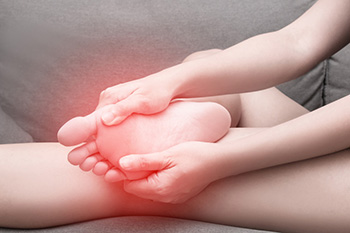
The metatarsals are the five long bones beneath the toes of the foot, also known as the midfoot. When the area between the toes and the metatarsals becomes painful, it is a condition termed metatarsalgia. Symptoms are inflammation, bruising and swelling. These in turn may result in numbness and tingling in the toes. Pain is typically felt in the ball of the foot. Better cushioning in the shoes and resting the feet more are some ways to reduce the pain. Causes of metatarsalgia include distance running and engaging in sports such as tennis, soccer, football, and baseball. Wearing poorly fitted shoes is another major cause of metatarsalgia. Culprits include high heels, shoes with a narrow toe box and sports shoes that lack ample cushioning. These types of shoes typically force the weight forward in a way that the ball of the foot is impacted. Other causes of metatarsalgia include bunions, hammertoes, and high arches, all of which can tend to alter proper foot alignment and gait. If the ball of your foot is aching on a regular basis, please consult a podiatrist for information on treatment options.
Foot Pain
Foot pain can be extremely painful and debilitating. If you have a foot pain, consult with Dr. Douglas Mckay from New Jersey . Our doctor will assess your condition and provide you with quality foot and ankle treatment.
Causes
Foot pain is a very broad condition that could be caused by one or more ailments. The most common include:
- Bunions
- Hammertoes
- Plantar Fasciitis
- Bone Spurs
- Corns
- Tarsal Tunnel Syndrome
- Ingrown Toenails
- Arthritis (such as Gout, Rheumatoid, and Osteoarthritis)
- Flat Feet
- Injury (from stress fractures, broken toe, foot, ankle, Achilles tendon ruptures, and sprains)
- And more
Diagnosis
To figure out the cause of foot pain, podiatrists utilize several different methods. This can range from simple visual inspections and sensation tests to X-rays and MRI scans. Prior medical history, family medical history, and any recent physical traumatic events will all be taken into consideration for a proper diagnosis.
Treatment
Treatment depends upon the cause of the foot pain. Whether it is resting, staying off the foot, or having surgery; podiatrists have a number of treatment options available for foot pain.
If you have any questions, please feel free to contact one of our offices located in Caldwell, and Galloway, NJ . We offer the newest diagnostic and treatment technologies for all your foot care needs.
Various Reasons for Toe Pain
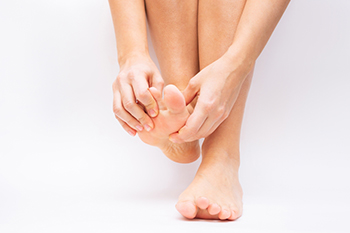
There are several reasons why people may experience toe pain. These can include having a broken toe, an ingrown toenail, or the painful foot condition that is known as gout. Nerve pain can develop from having tarsal tunnel syndrome, which can lead to toe pain. Pain that affects the nerve between the third and fourth toes may come from having Morton’s neuroma, which generally develops from frequently wearing high heels. Another painful foot condition is known as tennis toe, and is quite unsightly. This condition causes blood to pool under the toenail, and happens from constantly jamming the toe against the top of the shoe. The nail will turn a red and black color, and prompt medical attention is required to prevent toe joint pain. If you have toe pain for any reason, it is strongly urged that you speak with a podiatrist who can determine what the cause is, and treat it accordingly.
Toe pain can disrupt your daily activities. If you have any concerns, contact Dr. Douglas Mckay of New Jersey . Our doctor can provide the care you need to keep you pain-free and on your feet.
What Causes Toe Pain?
Most severe toe pain is caused due to a sports injury, trauma from dropping something heavy on the toe, or bumping into something rigid. Other problems can develop over time for various reasons.
Toe pain can be caused by one or more ailments. The most common include:
- Trauma
- Sports injury
- Wearing shoes that are too tight
- Arthritis
- Gout
- Corns and calluses
- Hammertoe
- Bunions
- Blisters
- Ingrown toenails
- Sprains
- Fractures (broken bones)
- Dislocations
When to See a Podiatrist
- Severe pain
- Persistent pain that lasts more than a week
- Signs of infection
- Continued swelling
- Pain that prevents walking
Diagnosis
In many cases the cause of toe pain is obvious, but in others, a podiatrist may want to use more advanced methods to determine the problem. These can range from simple visual inspections and sensation tests to X-rays and MRI scans. Prior medical history, family medical history, and any recent physical traumatic events will all be taken into consideration for a proper diagnosis.
Treatment
Treatments for toe pain and injuries vary and may include shoe inserts, padding, taping, medicines, injections, and in some cases, surgery. If you believe that you have broken a toe, please see a podiatrist as soon as possible.
If you have any questions please feel free to contact one of our offices located in Caldwell, and Galloway, NJ . We offer the newest diagnostic tools and technology to treat your foot and ankle needs.
Are You Suffering From Ingrown Toenails?
When Should Your Baby Be Walking?
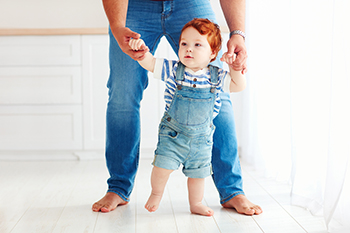
It’s hard to pinpoint exactly when a baby should be walking because they develop at different times. Many babies begin walking as early at 8 or 9 months, while others who are so-called late-bloomers may not begin until 16 months. Generally speaking, about half of babies have begun to take steps around 1 year old. The three factors that go into the process include muscle strength, balance, and temperament. The latter is the factor that most affects the age at which your baby will walk, experts say. Some babies continue to crawl because they can move faster than if they try to stand and walk. Early walkers can be more driven to try new motor skills, and lean babies often begin to walk earlier. Most babies simply decide for themselves when they are ready to walk, studies show. If you notice that your baby has certain foot gait abnormalities, such as pigeon-toed, walking on tiptoe, or duck walking, it is a good idea to see a podiatrist for an examination and discussion on possible treatment.
The health of a child’s feet is vital to their overall well-being. If you have any questions regarding foot health, contact Dr. Douglas Mckay of New Jersey . Our doctor can provide the care you need to keep you pain-free and on your feet.
Tips for Keeping Children's Feet Healthy
- Make sure their shoes fit properly
- Look for any signs of in-toeing or out-toeing
- Check to see if they have Clubfoot (condition that affects your child’s foot and ankle, twisting the heel and toes inward) which is one of the most common nonmajor birth defects.
- Lightly cover your baby’s feet (Tight covers may keep your baby from moving their feet freely, and could prevent normal development)
- Allow your toddler to go shoeless (Shoes can be restricting for a young child’s foot)
- Cut toenails straight across to avoid ingrown toenails
- Keep your child’s foot clean and dry
- Cover cuts and scrapes. Wash any scratches with soap and water and cover them with a bandage until they’ve healed.
If you have any questions, please feel free to contact one of our offices located in Caldwell, and Galloway, NJ . We offer the newest diagnostic and treatment technologies for all your foot care needs.
Orthotics and Heel Spurs
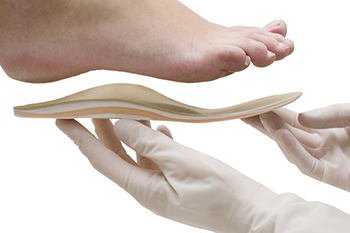
Heel spurs are pesky little bony growths that can develop on the bottom of the heel bone in the feet. Heel spurs are shaped like hooks. Since orthotics are devices that can help mitigate pain and treat foot conditions, many patients with heel spurs are curious about whether or not orthotics may be used to treat heel spurs. Interestingly, heel spur inserts can help with just that. Orthotic devices used for heel spurs typically come with significantly deep heel cups. Additionally, they will have major cushioning that is meant to increase the extent to which the device absorbs shock during weight-bearing activities. Typically, these orthotic devices can be made of a range of different materials, including foam and gel. If you are someone that struggles with heel spurs, consider contacting a podiatrist today to learn if you would benefit from the use of orthotics. Schedule an appointment today.
If you are having discomfort in your feet and would like to try orthotics, contact Dr. Douglas Mckay from New Jersey . Our doctor can provide the care you need to keep you pain-free and on your feet.
What Are Orthotics?
Orthotics are inserts you can place into your shoes to help with a variety of foot problems such as flat feet or foot pain. Orthotics provide relief and comfort for minor foot and heel pain but can’t correct serious biomechanical problems in your feet.
Over-the-Counter Inserts
Orthotics come in a wide variety of over-the-counter inserts that are used to treat foot pain, heel pain, and minor problems. For example, arch supports can be inserted into your shoes to help correct overarched or flat feet, while gel insoles are often used because they provide comfort and relief from foot and heel pain by alleviating pressure.
Prescription Orthotics
If over-the-counter inserts don’t work for you or if you have a more severe foot concern, it is possible to have your podiatrist prescribe custom orthotics. These high-quality inserts are designed to treat problems such as abnormal motion, plantar fasciitis, and severe forms of heel pain. They can even be used to help patients suffering from diabetes by treating foot ulcers and painful calluses and are usually molded to your feet individually, which allows them to provide full support and comfort.
If you are experiencing minor to severe foot or heel pain, it’s recommended to speak with your podiatrist about the possibilities of using orthotics. A podiatrist can determine which type of orthotic is right for you and allow you to take the first steps towards being pain-free.
If you have any questions please contact one of our offices located in Caldwell, and Galloway, NJ . We offer the newest diagnostic and treatment technologies for all your foot and ankle needs.
Cracked Heels in Children
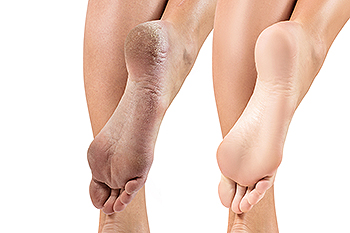
Cracks in the heels are much less likely to happen in children compared to adults. Children’s skin is more tender and less likely to be impacted by mechanical factors. However, there are some instances where children will get cracks in their heels, and this is usually when there is interference with metabolic or hormonal processes causing skin disturbances. The heels are often affected under these circumstances since the feet take on the burden of the weight of the body. Cracked heels can occur in children from stress, neuro-psychic changes, or insufficient nutrition, particularly vitamin deficiencies. Vitamins A and E normalize metabolic processes, remove toxins, and positively affect the condition of skin. Transition periods can be associated with cracks in the heels, such as beginning school, during adolescence, or a family disturbance, periods that often come with increased stress. Since more serious complications can arise from cracked skin on the heels, it is suggested you take your child to a podiatrist for an examination and treatment.
If the skin on your feet starts to crack, you may want to see a podiatrist to find treatment. If you have any concerns, contact Dr. Douglas Mckay from New Jersey . Our doctor can provide the care you need to keep you pain-free and on your feet.
Cracked Heels
It is important to moisturize your cracked heels in order to prevent pain, bleeding, and infection. The reason cracked heels form is because the skin on the foot is too dry to support the immense pressure placed on them. When the foot expands, the dry skin on the foot begins to split.
Ways to Help Heal Them
- Invest in a good foot cream
- Try Using Petroleum Jelly
- Ease up on Soaps
- Drink Plenty of Water
Ways to Prevent Cracked Heels
- Moisturize After Showering
- Skip a Shower
- Keep Shower Water Lukewarm
- Don’t Scrub Your Feet
If you are unsure how to proceed in treating cracked heels, seek guidance from a podiatrist. Your doctor will help you with any questions or information you may need.
If you have any questions, please feel free to contact one of our offices located in Caldwell, and Galloway, NJ . We offer the newest diagnostic and treatment technologies for all your foot care needs.
More...
Rock Climbing and Foot Injuries
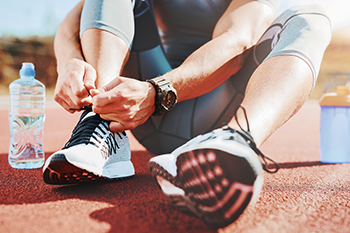
About half of all acute injuries sustained in rock climbing involve the legs and feet. Often these injuries happen from falls to the ground or rocks hitting a person during a fall. Rock climbers can suffer from strains, contusions, and fractures to the feet that can stop them from participating in this enjoyable activity for some time. Wearing shoes that are too tight can lead to overstrain injuries that can increase stress on the forefoot during rock climbing. If you are a rock climber and want more information about protecting your feet and ankles while participating in your sport, or if your lower extremities have been injured, consult with a podiatrist.
Sports related foot and ankle injuries require proper treatment before players can go back to their regular routines. For more information, contact Dr. Douglas Mckay of New Jersey . Our doctor can provide the care you need to keep you pain-free and on your feet.
Sports Related Foot and Ankle Injuries
Foot and ankle injuries are a common occurrence when it comes to athletes of any sport. While many athletes dismiss the initial aches and pains, the truth is that ignoring potential foot and ankle injuries can lead to serious problems. As athletes continue to place pressure and strain the area further, a mild injury can turn into something as serious as a rupture and may lead to a permanent disability. There are many factors that contribute to sports related foot and ankle injuries, which include failure to warm up properly, not providing support or wearing bad footwear. Common injuries and conditions athletes face, including:
- Plantar Fasciitis
- Plantar Fasciosis
- Achilles Tendinitis
- Achilles Tendon Rupture
- Ankle Sprains
Sports related injuries are commonly treated using the RICE method. This includes rest, applying ice to the injured area, compression and elevating the ankle. More serious sprains and injuries may require surgery, which could include arthroscopic and reconstructive surgery. Rehabilitation and therapy may also be required in order to get any recovering athlete to become fully functional again. Any unusual aches and pains an athlete sustains must be evaluated by a licensed, reputable medical professional.
If you have any questions please feel free to contact one of our offices located in Caldwell, and Galloway, NJ . We offer the newest diagnostic and treatment technologies for all your foot and ankle needs.
Flat Feet Exercises
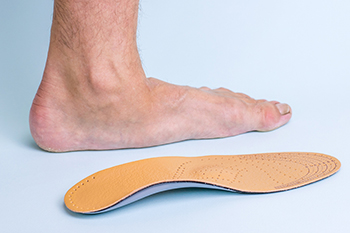
Flat feet are a condition of the feet and its name is quite literal. Those with flat feet have a foot shape that causes the entire sole of the foot to rest flush against the floor. This condition is, for many different patients, mostly benign. However, it may be a source of pain for many other patients. There are several different exercises that you might be able to perform to mitigate the condition of flat feet. By performing certain foot exercises, it is possible to correct sunken arches. First, someone could consider performing heel stretches. This exercise consists of standing in a lunge-like position and slowly leaning or bending into the stretch several times on each side. A person might even consider rolling a golf ball or tennis ball underneath their feet while in a seated position. Contact a podiatrist today for more information about how performing certain exercises might help you correct flat feet.
Flatfoot is a condition many people suffer from. If you have flat feet, contact Dr. Douglas Mckay from New Jersey . Our doctor will treat your foot and ankle needs.
What Are Flat Feet?
Flatfoot is a condition in which the arch of the foot is depressed and the sole of the foot is almost completely in contact with the ground. About 20-30% of the population generally has flat feet because their arches never formed during growth.
Conditions & Problems:
Having flat feet makes it difficult to run or walk because of the stress placed on the ankles.
Alignment – The general alignment of your legs can be disrupted, because the ankles move inward which can cause major discomfort.
Knees – If you have complications with your knees, flat feet can be a contributor to arthritis in that area.
Symptoms
- Pain around the heel or arch area
- Trouble standing on the tip toe
- Swelling around the inside of the ankle
- Flat look to one or both feet
- Having your shoes feel uneven when worn
Treatment
If you are experiencing pain and stress on the foot you may weaken the posterior tibial tendon, which runs around the inside of the ankle.
If you have any questions please feel free to contact one of our offices located in Caldwell, and Galloway, NJ . We offer the newest diagnostic and treatment technologies for all your foot and ankle needs.
Flat Feet Exercises

Flat feet are a condition of the feet and its name is quite literal. Those with flat feet have a foot shape that causes the entire sole of the foot to rest flush against the floor. This condition is, for many different patients, mostly benign. However, it may be a source of pain for many other patients. There are several different exercises that you might be able to perform to mitigate the condition of flat feet. By performing certain foot exercises, it is possible to correct sunken arches. First, someone could consider performing heel stretches. This exercise consists of standing in a lunge-like position and slowly leaning or bending into the stretch several times on each side. A person might even consider rolling a golf ball or tennis ball underneath their feet while in a seated position. Contact a podiatrist today for more information about how performing certain exercises might help you correct flat feet.
Flatfoot is a condition many people suffer from. If you have flat feet, contact Dr. Douglas Mckay from New Jersey . Our doctor will treat your foot and ankle needs.
What Are Flat Feet?
Flatfoot is a condition in which the arch of the foot is depressed and the sole of the foot is almost completely in contact with the ground. About 20-30% of the population generally has flat feet because their arches never formed during growth.
Conditions & Problems:
Having flat feet makes it difficult to run or walk because of the stress placed on the ankles.
Alignment – The general alignment of your legs can be disrupted, because the ankles move inward which can cause major discomfort.
Knees – If you have complications with your knees, flat feet can be a contributor to arthritis in that area.
Symptoms
- Pain around the heel or arch area
- Trouble standing on the tip toe
- Swelling around the inside of the ankle
- Flat look to one or both feet
- Having your shoes feel uneven when worn
Treatment
If you are experiencing pain and stress on the foot you may weaken the posterior tibial tendon, which runs around the inside of the ankle.
If you have any questions please feel free to contact one of our offices located in Caldwell, and Galloway, NJ . We offer the newest diagnostic and treatment technologies for all your foot and ankle needs.




